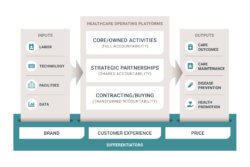March 11, 2020

Why Strategic Partnerships Are Vital To Hospital and Health Systems Success
In our January 9th, 2020, Market Corner Commentary we identified the following five forces that are coalescing to drive more value into the delivery of healthcare services:

- More disciplined purchasing of healthcare services;
- Consumerism;
- A deteriorating payer mix;
- New competitors; and
- A tougher, pro-competition
regulatory environment.
Their collective impact poses an existential threat to many health systems. Consequently, “business-as-usual” is no longer a viable option. Strategic partnerships, reconfiguring routine care, increasing productivity and effective revenue management are value-based strategies that enhance competitiveness and can provide for long-term market relevance. This article will examine the dynamics and potential of strategic partnerships.
Disruptive Change
Adapting to disruptive change is difficult for companies in any industry. It is particularly challenging for healthcare companies because their current business models and practices have a tendency to focus too much on optimizing revenue under fee-for-service (FFS) payment and not enough on value creation (right care at the right time in the right place at the right price).
FFS-driven business models can generate profits but also create significant fragmentation in care delivery and coordination. As healthcare payment evolves to full-risk bundles for episodic care and capitation for population health, health systems must adapt. Managing risk requires health systems to deliver consistent, convenient, holistic and cost-effective care services.
Successful companies focus on outputs, not singular ownership and control of production. To thrive in customer-oriented markets, health systems should develop operating platforms to deliver better healthcare services, at lower prices, with exceptional customer service.
All companies have inputs and outputs. The managerial art of great companies is organizing owned, partnered and contracted activities to offer products and services that customers want, at competitive prices. Getting this formula right can lead to market success. Competition for customers is what drives innovation.

How to Conquer Change

As evidenced by the industry’s slow progress to date, the transition to value-based care delivery represents a major undertaking for health systems. Most lack the consumer instincts and retail capabilities necessary to compete in price-sensitive market environments. To mitigate this deficiency, health systems should seek out strategic partnerships to enhance their capabilities.
To confront this operational challenge, health systems can align with strategic partners to deliver superior products and services. The right partnerships can create value for customers and partners alike. Dennis Dahlen, Mayo Clinic’s CFO, describes the appropriate division of labor within Mayo’s strategic partnerships as follows,
Mayo must be world-class in medical research, medical education and clinical delivery. That requires all of our corporate bandwidth. We need strategic partners, like Google in cloud computing and data-driven innovation, to help us optimize our operations, advance our capabilities and deliver consistently great outcomes for our customers.
—Dennis Dahlen, Mayo Clinic’s CFO
Strategic partnerships turbocharge performance and deliver better, more affordable products and services. They can enable health systems to give customers the healthcare products and services they need, want and desire at affordable prices. Consider Apple and Foxconn on iPhones; American Airlines and Citibank on affinity credit cards; Barnes & Noble with Starbucks on in-store cafes.
Target’s 2015 decision to sell its 1,600 pharmacies and 80 medical clinics to CVS Health illustrates the synergistic value of strategic partnerships. Post-closing, CVS owned and operated Target’s in-store pharmacies and clinics under its CVS brand. This was great for CVS, but it also was great for Target.
Target realized that it would never develop the scale and expertise necessary to compete effectively in retail pharmacy. Shedding its pharmacies freed Target to focus on its core grocery and merchandising businesses. Target stores benefit from the increased foot traffic provided by new CVS customers. Target customers benefit from improved efficiency, lower costs and more expansive pharmacy services. [1, 2]
‘Platforming’ the Future
Successful companies deliver high-quality outcomes and high-value products and services. This increasingly requires a “platforming” approach to business operations. For example, Target enhanced its operating platform by partnering with CVS for pharmacy services.
Platform companies prioritize outcomes, aiming to build strong brands and earn customer loyalty.
Platform companies like Amazon, Target and Uber have caused disruption and a reconfiguration of incumbent business practices. Essentially, they connect suppliers (where costs are) with customers (where the money is) through seamless data-driven digital systems. They aim to offer products and services at competitive prices with great customer experience.
At Amazon, for example, a relentless customer focus shapes business practices. Amazon owns customer relationships through their low prices, limitless choice, abundant convenience and constant touch points. Their strategy reveals a core truth: customers care about outputs, not the production process.
Platform companies are persistent about ownership and control. They win market share by building more efficient, cost-effective and ever-improving networks of connected capabilities to identify and fulfill customer needs. They populate their platforms with strategic partners that enhance their platforms’ ability to deliver superior products and services.
Takeaway
Healthcare is complex. It requires coordinated service execution across hundreds of business functions. Moreover, customer-driven market pressures for better outcomes and pricing transparency are pushing health systems to optimize all their performance. In response, enlightened health systems are platforming their operations to create value for customers.
No company excels at everything. Developing the right partnerships with companies that can deliver vital services under a unified brand is important to a health systems’ long-term sustainability. Strategic partnerships integrated into cohesive operating platforms designed to engage and earn customers represent the future state for successful health systems.
Health systems with the right strategic partners will go a long way together.
Sources
- https://www.forbes.com/sites/greatspeculations/2015/06/30/cvs-to-buy-all-of-targets-pharmacy-stores-a-win-win-for-both/#7b25d682508c
- https://www.usatoday.com/story/money/2015/06/15/target-cvs-pharmacy-sale/71248932/
Co-author
 Jeff Jones serves as Chief Commercial and Strategy Officer for Conifer Health Solutions. In this role, he defines the strategic direction for Conifer including the enterprise strategy, strategic partnerships, leads all commercial activities, heads client service and delivery, owns brand, marketing and go to market strategy, and directs new solution innovation. Jeff joined Conifer’s Executive Leadership Team in September 2019 bringing with him over 30 years of industry experience.
Jeff Jones serves as Chief Commercial and Strategy Officer for Conifer Health Solutions. In this role, he defines the strategic direction for Conifer including the enterprise strategy, strategic partnerships, leads all commercial activities, heads client service and delivery, owns brand, marketing and go to market strategy, and directs new solution innovation. Jeff joined Conifer’s Executive Leadership Team in September 2019 bringing with him over 30 years of industry experience.
Jeff’s experience in both the healthcare and technology industries coupled with his demonstrated track record partnering with health systems, academic medical centers, specialized providers, medical groups and health technology companies allows him to bring unparalleled insights into Conifer’s overall business.






